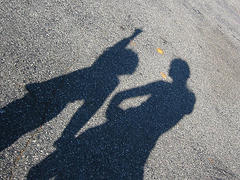Already this summer, I’ve had many opportunities to learn. I should have been blogging about all of these things, but that didn’t happen.
I was fortunate to attend ISTE in San Antonio. It was wonderful to connect with members of my PLN, get inspired, and learn from others. That learning will always continue through those connections and Twitter.
Recently I taught, with an amazing group, a course for educators about Google tools. I learned while working with all of them- the other facilitators and the participants.
One special highlight took place last week. My friend Lucie deLaBruere (@techsavvygirl) put together a course called Making Mobile Media Camp for Educators. One of the best things about it was that it was an opportunity for technology integrators, library-media specialists, teachers, and others to get hands-on learning time. Lucie brought others in from near and far to help lead various sessions. We were creators, not consumers.
I had the pleasure of working with Jessica Pack (@packwoman208) for most of the week. Here are some of the things I explored:
- Creating an iTunesU course
- Creating a Powtoon as one component of my course. (a new tool for me!)
- Learning about iBooks Author and starting the creation of a book.
The topic I chose for all components of my work was Digital Citizenship. My hope/dream is to complete the book and the course (ha!) in time for a day-long iPad training being held in our school in a few weeks. Ideally, teachers would explore the course, including the book, to get familiar with topics under the umbrella of digital citizenship. Then they’d use the same materials with their students as part of an introduction to iPads. Time is a huge factor – is it realistic for me to assume I can get this done and still enjoy my summer ‘time off’!?
In the process of doing all of these things, I learned so much about working with digital photos, editing video, structuring time, teaching, and much more.
We worked hard and learned a lot Monday through Thursday. My head is still spinning from the ideas, the tools, the techniques, and examples shared by Jessica. Friday was a bonus day during which we had a digital film challenge. Jessica led the way again, demonstrating how such challenges align with the Common Core and how much students learn from creating videos. We worked in small groups to simulate the film challenge in an abbreviated amount of time. For the challenge, each group had to make a film (using only iPads) that was suspenseful, including a fictitious name and the line “call me maybe”. It was a blast and there were many laughs while putting together our movie.
The week was perfect. I loved being a learner in that setting. I loved gathering ideas for how I might work with teachers and with students in an engaging, motivating manner. Thank you Lucie, and thank you Jessica for your patience, your resources, and so much more. I can’t wait to continue my learning!
Read Full Post »




